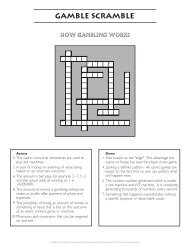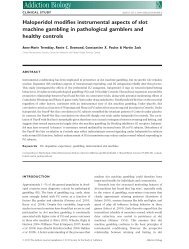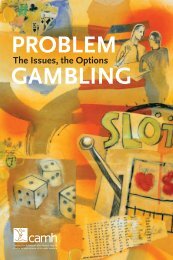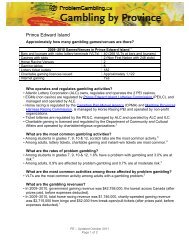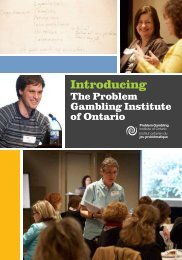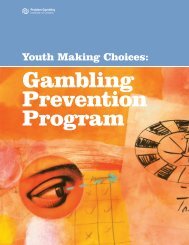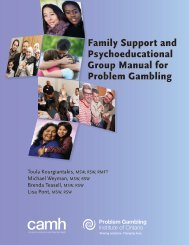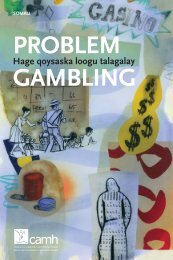Problem Gambling - A Guide for Families (PDF) - ProblemGambling.ca
Problem Gambling - A Guide for Families (PDF) - ProblemGambling.ca
Problem Gambling - A Guide for Families (PDF) - ProblemGambling.ca
You also want an ePaper? Increase the reach of your titles
YUMPU automatically turns print PDFs into web optimized ePapers that Google loves.
Moving toward Change<br />
counselling be<strong>ca</strong>use family members encourage them. You<br />
may want to seek the help of a counsellor yourself be<strong>for</strong>e trying<br />
to do this.<br />
communi<strong>ca</strong>tion tips <strong>for</strong> families*<br />
• Focus on the specific ways that gambling affects you. Be direct<br />
and use “I” statements to share facts and feelings. For example:<br />
“I feel hurt when you don’t come home at the time you said.”<br />
“I’m angry when we don’t have money to pay our bills be<strong>ca</strong>use of<br />
your gambling.”<br />
“I’m frightened by your gambling debts.”<br />
• Stay <strong>ca</strong>lm. Try not to blame, lecture or moralize. It doesn’t<br />
help. Let the person know you are getting in<strong>for</strong>mation and<br />
support <strong>for</strong> yourself.<br />
• Avoid threats—but do let the person know what you will do if<br />
he or she keeps gambling. Be prepared to follow through. The<br />
person may have heard you make threats be<strong>for</strong>e, and may not<br />
believe you will act.<br />
• Provide helpful in<strong>for</strong>mation. Offer to support the person in<br />
getting help. Learn about problem gambling counselling<br />
services, and give the person resources such as self-help<br />
in<strong>for</strong>mation, books and videos.<br />
• Be patient. Change may take time. Don’t expect the person to<br />
admit to the problem, or to accept that he or she needs help,<br />
right away. Keep planting the seeds of change. Tell the person<br />
that taking action will lead to less family conflict and stress.<br />
• Watch <strong>for</strong> depression and suicidal thoughts in the person who<br />
gambles, yourself and other family members (see page 21).<br />
Your “tough<br />
love” <strong>ca</strong>n help<br />
make the<br />
person face the<br />
cost of his or<br />
her gambling.<br />
Helping the Person Take Responsibility<br />
<strong>for</strong> Behaviour and Decisions<br />
People are more likely to deal with their gambling problems<br />
when they really feel the hurt their gambling is <strong>ca</strong>using. Of<br />
course, your help and support are important to the person<br />
with a gambling problem. But it is still the person’s own<br />
responsibility to fix the problem. Only he or she <strong>ca</strong>n decide to<br />
29





